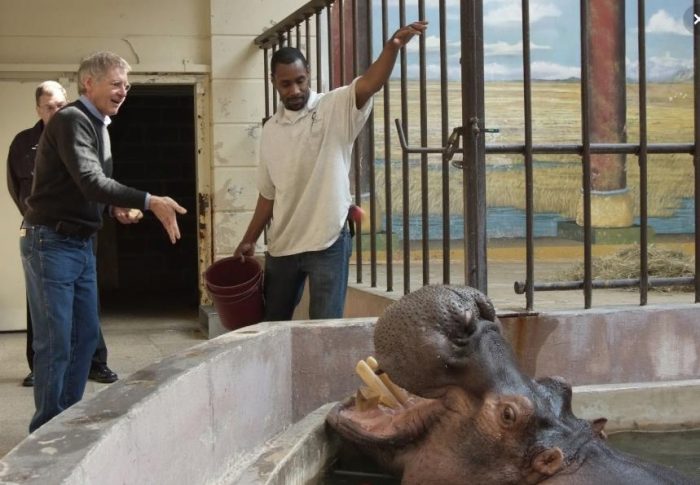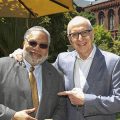James Smithson Bicentennial Medal awarded to actors Harrison Ford and Betty White
Ford accepted his medal Han Solo, as Ms. White was unable to attend the presentation at the Sept. 28 fundraising gala for the National Zoo.

Actor Harrison Ford , left, helps Smithsonian Natonal Zoo animal keeper Jay Tee Taylor feed the zoo’s 5,000-pound Nile hippopotamus, Happy, in 2009. (Photo by Jessie Cohen)
Most of the guests oohed and aahed over the live animals — a Chinese alligator, a red macaw, South African penguins and more adorableness — at Thursday’s gala for the Smithsonian National Zoo.
But not Harrison Ford. The actor and passionate conservationist doesn’t do cute.
“My favorite animal is the human being, because it has the capacity to change the world in a way that other animals do not,” he said in an interview before the dinner. “And it has the capacity to protect all animals, not just the cute ones.”
The party was held at the Smithsonian’s National Portrait Gallery — the first fundraiser ever held off zoo grounds — and featured a dozen animal “ambassadors” (the ones relaxed enough to allow people to fawn and take selfies) and one very big movie star.
Ford, 75, received the James Smithson Bicentennial Medal for his lifelong work on behalf of global conservation. (Betty White also received the award for her work on behalf of animal welfare, but the 95-year-old actress was unable to make the trip from California to accept it.)

Amy Eveleth, left, and Charlotte Hickok with Yang the Chinese alligator at “Monkey Business,” a fundraiser for the Smithsonian National Zoo. – (Smithsonian’s National Zoo)
Ford just got back from Africa, where he and his family watched the annual wildebeest migration, during which more than a million of the animals traverse Tanzania and Kenya in search of food and water.
“This is the uncutest animal in the world,” he said. “They look like a collection of spare parts. What I’m looking at is not whether the animal is beautiful or not. I’m looking at the raw, visceral power of nature.”
Growing up, Ford wanted to be a forest ranger but got sidelined by that movie thing, which worked out pretty well for him. (He holds the record for starring in the most successful movies in Hollywood.)
And it was clear that he’s spent a lot of time thinking about the issue.
“We need a functional, prospering nature in order to survive on this planet,” he said. While it’s easy to single out endangered species — especially the cutest mammals — Ford believes that it’s impossible to pick and choose because of the sophistication and interdependence of biodiversity around the globe.
“For me, the complexity of nature is proof of the existence of what serves me as a god,” he explained. “I admit that there are many gods in the world, and I’m happy that everybody has found something to believe in above themselves and organize some kind of morality around. But nature is my god, yes.”
“I’m scared to death about the denial of science,” said Ford. “Science is real. Science is the most real thing in our world, other than nature. I’m hoping we’ll all get back to a place where we can really understand that science is tested knowledge.”
This article by Roxanne Roberts was originally published by the Washington Post.
Posted: 2 October 2017
-
Categories:
Kudos , News & Announcements , Science and Nature , Zoo & Conservation Biology Institute








